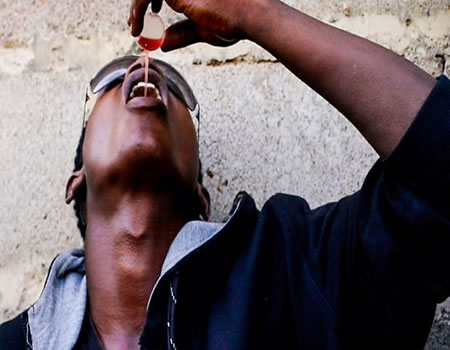For quite a long time now, people have used the syrups containing codeine as a means of ‘getting high’ and for the most part, Nigerian youths have been implicated in the abuse. The video clip from the BBC also showed an incident in a rehabilitation centre in Kano, Kano State, in which an addict was violent and too dangerous to be afforded any human company. Codeine has all the attributes of unmitigated danger. Sweet, cheap, lethal and potent, it is easier to access than cocaine, marijuana and other hard drugs. Presented as a regular drug, its continuous use however ensures the steady deterioration and eventual damage of the brain and other internal organs in the human body. According to the video clip, the addicted victims are usually chained to the floor to prevent them from being violent and the medicine has become a street drug.
Three million bottles of codeine are allegedly consumed by these ‘syrup girls and boys’ on a daily basis, and vast quantities have been seized and destroyed by the affected state governments. The BBC used undercover tactics to expose the men who have been illegally selling this drug to the public and one of them caught on camera confessed that he could dispose of one million cartons in just one week! Obviously, the traffic of the drug is as swift as the attendant flow of money from its victims. According to the seller caught in the BBC camera, the addicts are always ready to do anything, including selling off their prized possessions, to have access to the drug’s lethal refill.
According to a research conducted by the Development Initiative of West Africa (DIWA), 30,000 bottles of cough syrups containing codeine are consumed daily in Niger State. The agency further claimed that three million bottles of the product are consumed across the country on a daily basis. Speaking at the quarterly DIWA awareness programme on the codeine menace, the Niger State DIWA boss, Mallam Musa Mohammed el-Sani, decried the high rate of consumption of the product by women and young people in the state. Without doubt, the projected volume of codeine consumed across the country is lethal, with dire consequences, especially for the future generation. It is no wonder then that a ban was recently placed on the drug. But the efficacy of a ban remains to be felt: the fear among the people is that it may only up the ante for the drug since people will still find ways of gaining access to it.
This ugly development must be blamed on the loose pharmaceutical market in the country where prescription drugs are readily available. It is sad and unfortunate that this development had to be exposed by the BBC for the government to be apprised of the epidemic dimension that codeine consumption has assumed in the country. The high level of despondency in the society occasioned by the dire economy and youth unemployment is certainly a predisposing factor for the pervasive youth addiction problem. The youths are in search of a meaning in their empty lives. The future generation of the country has already been decimated and compromised by the drug addiction problem.
Although the reports on drug abuse in the country seem to emphasise the damage done to the North, the damage control should be comprehensive enough to cover the whole country. Since the ban is national, the damage control should also be national. There are unlimited interactions across the country and these youths are not restrained in their desire for drugs. Apart from public education and awareness by the National Orientation Agency (NOA), the campaign against abuse of codeine must touch both the family and school systems in the country. These are the major sources of the decay in the society.





